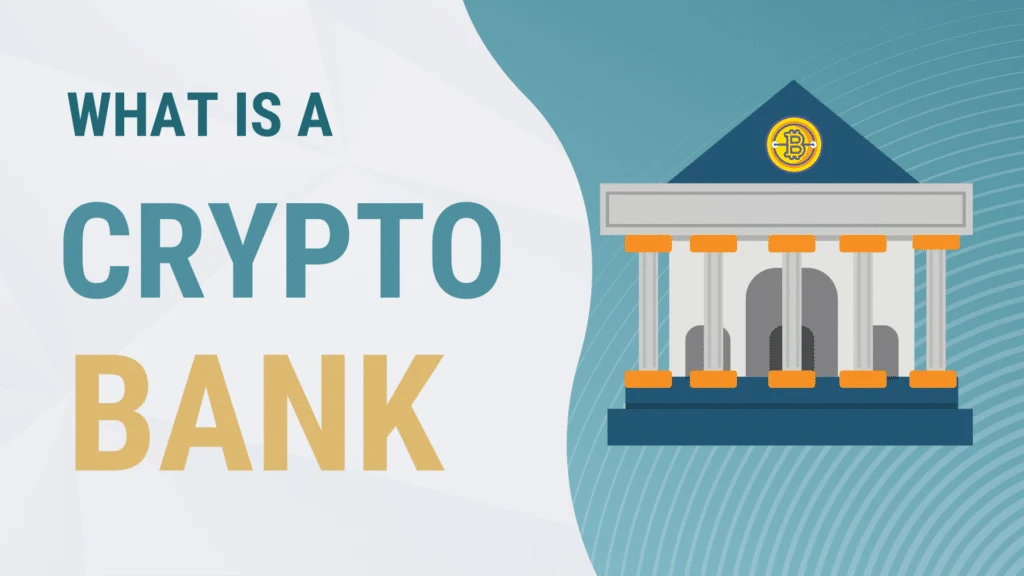What is a Cryptocurrency Bank?
A cryptocurrency bank is an institution that offers crypto-related financial services such as lending, borrowing, and interest on cryptocurrency savings.
The long definition
A crypto bank is a financial services provider that deals mainly in cryptocurrencies. Like a traditional bank, it accepts deposits, issues loans, pays interest on deposits and receives interest from loans. But the difference is, with a crypto bank, funds are in the form of crypto tokens and coins.
Examples include Avanti, Custodia, Gemini, and Kraken.
An institution doesn’t have to deal exclusively in digital assets to be considered a crypto bank. Any firm providing crypto services can be considered a crypto bank.
Goldman Sachs, JPMorgan, and Wirex are examples.
Closely related to crypto banks is crypto banking. Crypto banking is the practice of managing cryptocurrencies at any financial institution.

What Crypto Banks Do
Over the past decade, cryptocurrencies have established themselves as legitimate financial assets. So, naturally, a wide range of financial services has emerged, including those similar to what’s offered by conventional banks. These services include:
Buying and Selling Crypto
This is not crypto buying and selling in the sense of a centralized exchange (CEX). A CEX is specifically for buying and selling crypto, whether you’re using fiat money to buy crypto, trading crypto for crypto, or selling crypto for fiat.
With a cryptocurrency bank, you’re not really trading directly on an exchange platform. Instead, the banking platform allows you to buy, sell, and hold digital currencies directly from your account. Only a few banks offer this service.
Crypto Interest Account
This is the equivalent of a savings account. The firm takes crypto deposits from users, which they use to make loans to other customers. These loans will be repaid with interest, some of which goes to the depositors as yield.
Crypto interest accounts may offer higher interest than traditional savings accounts, These rates might be as high as double digits.
This is because the arbitrage margin for crypto banks is bigger. Arbitrage refers to the difference between the interest that the platform pays to depositors and the one it receives from borrowers. It’s bigger in crypto banking because the volatile nature of crypto allows borrowers to make trades that generate high returns. Therefore, they’re generally willing to pay higher loan interest rates.
So far crypto banks have not been regulated like traditional banks. They are not required by law to keep reserves for bad loans. So they can loan as much as they want to borrowers and maximize returns. This can be risky.
Crypto Loans
Crypto loans are similar to regular loans. Borrowers place collateral before taking out a loan repay with interest. The collateral is usually another cryptocurrency, like Ethereum or Bitcoin.

Risk of Crypto Banking
The most significant risk of crypto banking lies in the volatility of crypto assets. Their value can fluctuate so suddenly and at a much bigger scale than other assets.
Many crypto banks are centralized and custodial (meaning they hold crypto on behalf of the user). The risk here is that crypto banking is a largely unregulated sector. This means that crypto held in these institutions is not insured by the state. So if they fail, there is no guarantee you’ll recover your assets.
A good example is Celsius. At its height, Celsius operated like a crypto bank. It allowed users to deposit their crypto and/or take out collateralized crypto loans. However, the platform apparently suffered a lot from the bear market in June 2022. In response, it froze withdrawals, blocking almost 2 million customers from accessing their funds.
Since Celsius is a centralized business, legal action followed. But, while the case worked its way through the court system, customers couldn’t do anything. As the crypto winter got worse, some people’s assets became worthless.
